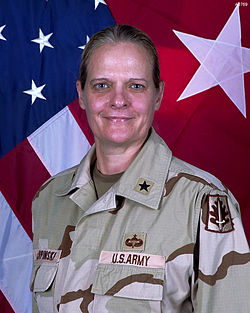Janis Karpinski Quotes
About Author
Janis Leigh Karpinski (née Beam, born May 25, 1953) is a retired career officer in the United States Army Reserve. She is notable for having commanded the forces that operated Abu Ghraib and other prisons in Iraq in 2003 and 2004, at the time of the scandal related to torture and prisoner abuse. She commanded three prisons in Iraq and the forces that ran them.
In June 2003, during the United States-led occupation of Iraq, Karpinski was given command of the 800th Military Police Brigade, which meant she was responsible for the 15 detention facilities in southern and central Iraq run by Coalition forces. Karpinski was also given command of the National Guard and Army reserve units in the Iraqi city of Mosul. In January 2004, Lieutenant General Ricardo Sanchez formally suspended Karpinski and 16 other soldiers with undisclosed reprimands. An investigation was started into the abuse at Abu Ghraib, and Karpinski left Iraq for reasons that were explained at the time as part of "routine troop rotations."
On April 8, 2005, Karpinski was formally relieved of command of the 800th Military Police Brigade. On May 5, 2005, President George W. Bush approved Karpinski's demotion to colonel from the rank of brigadier general. Her demotion was not related officially to the abuse at Abu Ghraib.
In October 2005, she published an account of her experiences, One Woman's Army, in which she claims that the abuses were done by contract employees trained in Afghanistan and Guantanamo Bay, and sent to Abu Ghraib under orders from the Secretary of Defense Donald Rumsfeld. She said her demotion was political retribution.
Since this time, some of Karpinski's claims of top-level authorization have been confirmed by revelations of what are known as the Torture Memos, legal opinions prepared by political appointees including John Yoo in the Office of Legal Counsel, Department of Justice. His memo of March 14, 2003, five days before the US began its invasion of Iraq, concluded that federal laws related to torture and other abuses did not apply to interrogators working overseas; it was issued to William J. Haynes, the General Counsel of DOD, and finally revealed in 2008 as a result of a Senate hearing into enhanced interrogation techniques.
In June 2003, during the United States-led occupation of Iraq, Karpinski was given command of the 800th Military Police Brigade, which meant she was responsible for the 15 detention facilities in southern and central Iraq run by Coalition forces. Karpinski was also given command of the National Guard and Army reserve units in the Iraqi city of Mosul. In January 2004, Lieutenant General Ricardo Sanchez formally suspended Karpinski and 16 other soldiers with undisclosed reprimands. An investigation was started into the abuse at Abu Ghraib, and Karpinski left Iraq for reasons that were explained at the time as part of "routine troop rotations."
On April 8, 2005, Karpinski was formally relieved of command of the 800th Military Police Brigade. On May 5, 2005, President George W. Bush approved Karpinski's demotion to colonel from the rank of brigadier general. Her demotion was not related officially to the abuse at Abu Ghraib.
In October 2005, she published an account of her experiences, One Woman's Army, in which she claims that the abuses were done by contract employees trained in Afghanistan and Guantanamo Bay, and sent to Abu Ghraib under orders from the Secretary of Defense Donald Rumsfeld. She said her demotion was political retribution.
Since this time, some of Karpinski's claims of top-level authorization have been confirmed by revelations of what are known as the Torture Memos, legal opinions prepared by political appointees including John Yoo in the Office of Legal Counsel, Department of Justice. His memo of March 14, 2003, five days before the US began its invasion of Iraq, concluded that federal laws related to torture and other abuses did not apply to interrogators working overseas; it was issued to William J. Haynes, the General Counsel of DOD, and finally revealed in 2008 as a result of a Senate hearing into enhanced interrogation techniques.
